Josh Alan Friedman's Blog, page 7
November 7, 2011
Al Goldstein, BENEATH CONTEMPT
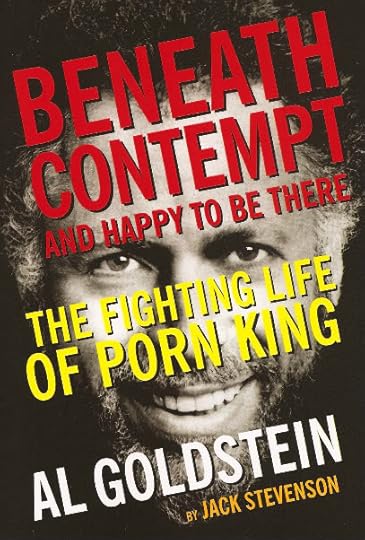
Jack Stevenson is a writer and film-festival curator in Denmark. His bird's-eye view into the odyssey of Al Goldstein and Screw comes from a uniquely European perspective--where America's madness can be sanely analysed and enjoyed. I recommend this book to the Queen of England.
"New history and fresh insight into that counter-cultural battering ram once known as Al Goldstein. Stevenson's work has resulted in something rarely seen: an important book. (Full disclosure: I don't come off too bad, either.)"
--Josh Alan Friedman (Tales of Times Square)
Order your copy of Beneath Contempt from Amazon here
 .
.
Published on November 07, 2011 00:01
October 31, 2011
WANTED! More Readers Like...
From the editor's desk:
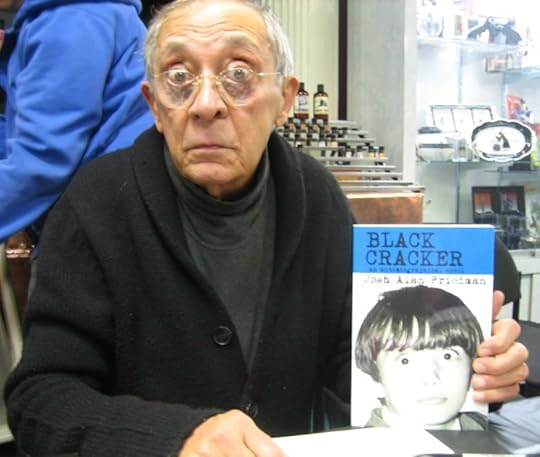 He made it to Barney Miller's station house on seven occasions (playing seven different characters), Kojak twice and The Streets of San Francisco three times. A television mainstay, he's guested on series from Benson to Twin Peaks to Beverly Hills, 90210. He acted for the incomparable Robert Downey, Sr. in No More Excuses, Pound and Greaser's Palace. He's memorable in Bugsy, The Star Chamber and Weekend at Bernie's. But the role he's probably best known for is his unforgettable comic turn as Ernie, the jumpy Teutonic mortician, in Return of the Living Dead.
He made it to Barney Miller's station house on seven occasions (playing seven different characters), Kojak twice and The Streets of San Francisco three times. A television mainstay, he's guested on series from Benson to Twin Peaks to Beverly Hills, 90210. He acted for the incomparable Robert Downey, Sr. in No More Excuses, Pound and Greaser's Palace. He's memorable in Bugsy, The Star Chamber and Weekend at Bernie's. But the role he's probably best known for is his unforgettable comic turn as Ernie, the jumpy Teutonic mortician, in Return of the Living Dead.
Just in time for Halloween, the great Don Calfa does the cover!
Send your good wishes to Mr. Calfa on Facebook here.
Black Cracker is available NOW; signed copies are available here.
photo © 2011 Wyatt Doyle

 He made it to Barney Miller's station house on seven occasions (playing seven different characters), Kojak twice and The Streets of San Francisco three times. A television mainstay, he's guested on series from Benson to Twin Peaks to Beverly Hills, 90210. He acted for the incomparable Robert Downey, Sr. in No More Excuses, Pound and Greaser's Palace. He's memorable in Bugsy, The Star Chamber and Weekend at Bernie's. But the role he's probably best known for is his unforgettable comic turn as Ernie, the jumpy Teutonic mortician, in Return of the Living Dead.
He made it to Barney Miller's station house on seven occasions (playing seven different characters), Kojak twice and The Streets of San Francisco three times. A television mainstay, he's guested on series from Benson to Twin Peaks to Beverly Hills, 90210. He acted for the incomparable Robert Downey, Sr. in No More Excuses, Pound and Greaser's Palace. He's memorable in Bugsy, The Star Chamber and Weekend at Bernie's. But the role he's probably best known for is his unforgettable comic turn as Ernie, the jumpy Teutonic mortician, in Return of the Living Dead. Just in time for Halloween, the great Don Calfa does the cover!
Send your good wishes to Mr. Calfa on Facebook here.
Black Cracker is available NOW; signed copies are available here.
photo © 2011 Wyatt Doyle
Published on October 31, 2011 00:01
October 26, 2011
"Bela Lugosi" from THE WORST!

From THE WORST! Josh Alan's original musical based on the life of Ed Wood.
THE WORST! is available on CD and digital download from CD Baby. Click here to purchase.
© 1994, 2011 Josh Alan Friedman
Video by Wyatt Doyle, with artwork by Drew Friedman (from WARTS AND ALL by Drew Friedman and Josh Alan Friedman). Visit DrewFriedman.net
Published on October 26, 2011 11:10
September 4, 2011
Kiss My Big Black Ass: Jerry Leiber's Life in Spades

Atlantic Records co-founder Jerry Wexler and songwriter Jerry Leiber both related this anecdote:
Leiber never went out to see live music—not even his own groups like the Coasters, Drifters or Elvis. But in June 1971, Wexler coaxed him to attend closing night of the Fillmore East. The moment The Allman Brothers, an Atlantic/Capricorn group, broke big. Leiber was claustrophobic and couldn't stand crowds. Furthermore, he told Wexler, "These guys are your band, they're bad-ass musicians—but I don't know who they are, and I don't give a fiddler's fuck about them or the Fillmore."
Wex said, "There are people around the world who idolize you. You don't go out to music, you don't fuckin' know. I told Duane Allman I'd bring you up to the dressing room and he said, 'You're full of shit. Jerry Leiber's been dead for years.' I want to prove that my word's good."
So they go to the Fillmore, where flowers are arranged on reserved seats for the two Jerrys.
"I sat in the audience," said Leiber, "and it started to fucking rain on the inside of the theater. I panicked and told Wex to get me the fuck out of here, but it was too crowded to leave. He said somebody set off the sprinkler system but there's no fire. I said I don't give a fuck, get me out of this goddamn auditorium. We went to the exit which was barred shut, bolted from the outside because kids were trying to break in."
Wex turns to Leiber, who's soaked, and says, "Hey, man, do this for me. Just this once. Come visit Duane."
"I'm about to have a heart attack," remembered Leiber, "there could be a fire, the doors are barred. And he's worried what Duane Allman thinks, to show I'm alive to impress him. Wexler collects people like big-game hunters collect heads."
So Wexler maneuvers them into the dressing room. Duane Allman is shirtless, pale and skinny, whacked out of his skull while stringing his Les Paul. (He would be killed in a motorcycle wreck a few months after this night.)
Wexler says, "Duane, didn't I promise you? Well, here he is. Jerry Leiber."
Allman stares up hazily at this wet, anxiety-ridden figure.
"You're fulla shit. Jerry Leiber's been dead for four years."
"I'm not kidding you, this is the man," says Wexler. "Tell him who you are, Jer."
"I wanted to say I'm Max Schmeling, leave, and destroy the moment for Wexler forever," Leiber remembered. "I could see it meant so much to Wex, so I complied. 'He's telling the truth. I'm Jerry Leiber and I didn't die four years ago.' But whatever I said was gonna be pointless."
The most potent songwriter and producer of the rock 'n' roll era was such an iconic, remote figure, that 24-year-old Allman thought it was some con. As if Jerry was a myth, couldn't possibly exist. Leiber bolted out of there, more resolute than ever to avoid live concerts.
Well, forty years later, as of last week, Jerry Leiber is now finally not alive. My father brought him home and introduced me in 1965, when I was nine years old and clueless. Some guy who'd written Elvis' songs before my time, which meant nothing to me. But he also wrote something called "Kansas City," that just appeared on Beatles '65. That fact got my attention in a big way. It was straight-out rock 'n' roll, different than regular Beatle songs, the odd music they'd apparently grown up on.
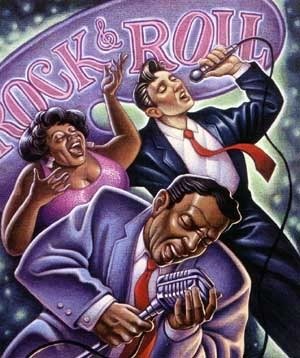
The sheer magnitude of what Leiber & Stoller accomplished is mind-boggling—they fathered rock 'n' roll, they put the dominant AABA song structure in popular music, and were the first to be called "record producer." They began as R&B songwriters, and I wonder whether they ever listed their mission statement on tax returns: Making Black Folks Laugh.
I never let cosmic distractions, as listed above, get in the way of friendships. Especially when preparing cornbread and ribs in the kitchen with Jerry Leiber, like an old Jewish grandma. As with any great figure, you're also dealing with a mere human being. He had a preference for writer friends over music people. He grew up in a Baltimore slum speaking Yiddish, but learned meter from Rudyard Kipling and Edgar Allan Poe (also from Baltimore). He devoured Proust as a child. Privately, he kept revising the lyrics from songs he wrote long ago, always reaching for what he considered to be the perfection of Irving Berlin.
The "playlets"—those 50 two-and-a-half minute radio plays that Leiber & Stoller did with their alter-ego vaudevillian do-wop group, The Coasters—were the most lyric-driven canon of songs ever written. Leiber & Stoller's range was magnificent, from early ditch blues to late Sinatra. "The Girls I Never Kissed" would have been a smash, had Sinatra's voice only behaved during two attempted recording sessions.
Jerry Leiber bequeathed me the only unreleased song from the Leiber & Stoller catalog of the 1950s, "Strike A Match." The song takes place in a dimly lit Negro bar where, after dancing and before the first kiss, the guy tentatively asks the girl to: Strike a match/Let me see/Yo' face/Yo' face." They'd written it for Howlin' Wolf or Muddy. Then it got lost in a closet for 45 years. Leiber thought the three greatest male blues voices were Memphis Slim, Muddy and Howlin' Wolf.
"I can't sing like that," I said. And didn't want to affect a Black voice. Different physiology.
"Doesn't matter," he said. "It's attitude."
"Strike A Match" came out, if such could be said, in 2001. A few years later Leiber agreed to produce a solo album of me doing his purest blues songs. He hadn't really been in the studio in a few decades. Not since the '70s when he and Mike Stoller last produced Peggy Lee, Elkie Brooks, Procol Harum, a T-Bone Walker tribute album, and Stealers Wheel, including the single "Stuck in the Middle with You." After that, they even refused the Rolling Stones.
So why, you might ask, would Leiber take interest in a bum such as I? Well, many entities that Leiber & Stoller bestowed their magic upon were cherry-picked from out of nowhere. That's how those groups became famous.
"I wrote for people I loved," he once told me. "The rest got my leftovers." So maybe I was getting his leftovers. And I knew I was born too late. Come back 30 years ago, and he'd put you on the charts. He could do it with anybody.
He also produced the construction of his early 20th century Greene & Greene-style house like a record, in Venice Beach, California. He put me up there for a manically enchanting week. We rehearsed some and even attempted to write new songs. Off the clock, bullshitting, Jerry's wit was sharp as ever. He still maintained a childlike playfulness in his genius with language and could pull lines out of the sky like lightening.
But when play turned to work, it turned mundane. He immediately excised all lines about gynecology from a song of mine. And the song was about a gynecologist.
"But Jer, that's the best stuff."
"Whaddya crazy, you can't say that shit." Well, I figured, maybe he knows what he's talking about.
The first session was booked at Nightbird, his son Jed's recording studio under the Sunset Marquis Hotel, near the Leiber & Stoller offices. On the way to the studio, Jerry got a call from the studio manager who wanted his credit card number. Jerry had originally financed the whole joint, and here his son was going to charge him by the hour. He went ballistic over the phone—and thus our production was, predictably, cancelled. There was no way Jerry Leiber was going back to the studio, any more than Muhammad Ali was going back to the ring.
I spent a year under unpaid contract with him, to be billed equally as co-writer of his autobiography. It was to be called Kiss My Big Black Ass. The cover was to be a mule's ass, its head turned around with the face, naturally, being that of Jerry. Leiber's handlers were, of course, appalled, and pressed on for a sanitized Leiber & Stoller autobiography to be written with David Ritz, the official biographer of music pioneers. Ritz had about eight other books going that year. Stoller wanted a mannered, politically correct book that, in spirit, might be called, And Then We Wrote...
But Jerry always reached for the jugular. Even with his talented sons, who endured the most stinging Jewish-father tsuris since Abraham bound Issac to the altar (Look at you, you're 50 years old and never had a Top 10 hit.).
I salvaged some of our material for the 77-page lead-off chapter of Tell the Truth Until They Bleed. Though he gave his permission, he ended up furious with several revelations. A few tidbits about money, and his tendency to become what he called "Grandma Hyde" (as in Dr. Jekyll) and go off the deep end, destroying one project and collaborator after another. But there remained an abundance of unpleasantness that I left out of my book forever, in deference to my enormous respect for both Leiber and Stoller and their legacy.
Leiber & Stoller's Brill Building office had the highest level of staff songwriters in history. Inspired by Jerry and Mike, they worked 9-to-5 in little piano cubicles. The smaller the cubicle, the bigger the hit. Songwriting was a highly specialized craft and art in Leiber's heyday. Most groups did not write their own material. That was left to experts. If you take a cold look at what happened in the wake of Dylan and the Beatles—suddenly everyone in the world was a songwriter, and groups wrote their own songs. There was a burst of collective genius in those times. But songwriting basically changed from a professional's domain to a free-for-all where amateurs took over the ship. To this day. If you don't see any disparity in that, compare your songs to the full-time professionals of Leiber & Stoller's stable—Goffin & King, Barry and Greenwich, Pomus & Shuman, Mann and Weil, early Burt Bacharach, Neil Diamond. There's a difference, right? Songwriting was a business.
Jerry Leiber occupied his own hipster universe: "I have no sense of long distance and time and ancient history. It's like we cut our songs last night." He was a walkin', talkin' street-wise sharpie, the embodiment of his own songs. He was reckless, but a great connoisseur of clothes, art and ghetto cuisine. Turned on by intellectually pretentious women, several notches down from pretty. He felt double-crossed by everybody, and double-crossed them back.
But I believe Jerry Leiber was wittier, greater and more important than Irving Berlin. I love and miss the bastard. I imagine the mythical Jerry in his final hours, like the character of his song "D.W. Washburn," a gentleman who won't get up from the gutter with his bottle of wine. Who toasts his saviors, but says No Thanks, "I believe I got it made."
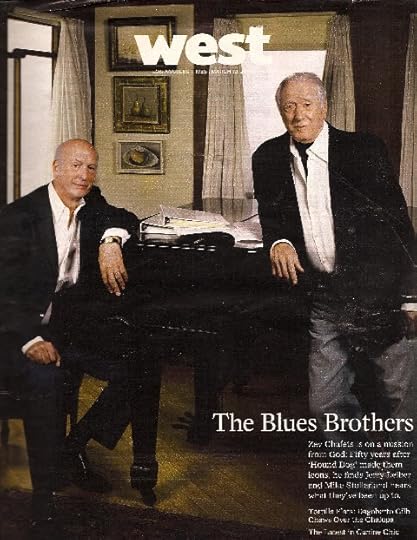
© 2011 Josh Alan Friedman
Published on September 04, 2011 18:01
August 29, 2011
"Famous & Poor" LIVE in Dallas
Josh Alan performs "Famous & Poor" live at the Sons of Hermann Hall in Dallas, TX. August, 2011
Published on August 29, 2011 00:01
August 22, 2011
"Down Home Girl" Live at Alias Books East
 To watch on YouTube, click the image. For Vimeo, see below.
To watch on YouTube, click the image. For Vimeo, see below.Live From Alias Books East, Los Angeles, June 2011.
© 2011 Josh Alan, Wyatt Doyle
Published on August 22, 2011 00:01
August 15, 2011
Wanted! More Readers Like...
From the mailbag:
Josh -
For the record, not so famous guys are among your readers too. (Your book cover ended up as a Kilroy Was Here look, but it still works.)
- Michael
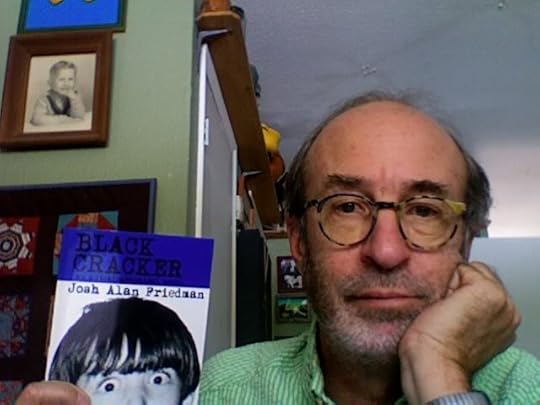 Self-described "not-so-famous" Texas-based novelist/actor Michael Zagst is author of M.H. Meets President Harding, The Sanity Matinee, The Greening of Thurmond Leaner, The End of the World, Blood Flow and The Wonderful World of Color. Several have recently become available in electronic format.
Self-described "not-so-famous" Texas-based novelist/actor Michael Zagst is author of M.H. Meets President Harding, The Sanity Matinee, The Greening of Thurmond Leaner, The End of the World, Blood Flow and The Wonderful World of Color. Several have recently become available in electronic format.
Black Cracker is available NOW; signed copies are available here.

Josh -
For the record, not so famous guys are among your readers too. (Your book cover ended up as a Kilroy Was Here look, but it still works.)
- Michael
 Self-described "not-so-famous" Texas-based novelist/actor Michael Zagst is author of M.H. Meets President Harding, The Sanity Matinee, The Greening of Thurmond Leaner, The End of the World, Blood Flow and The Wonderful World of Color. Several have recently become available in electronic format.
Self-described "not-so-famous" Texas-based novelist/actor Michael Zagst is author of M.H. Meets President Harding, The Sanity Matinee, The Greening of Thurmond Leaner, The End of the World, Blood Flow and The Wonderful World of Color. Several have recently become available in electronic format.Black Cracker is available NOW; signed copies are available here.
Published on August 15, 2011 00:01
August 7, 2011
"Rollin' / Just as I Was" (w/ Rev. Raymond Branch)
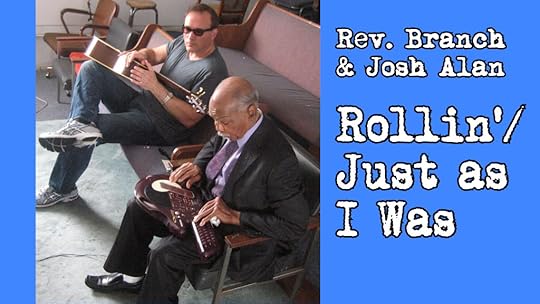 To view on YouTube, click the above image. To watch via Vimeo, see below.
To view on YouTube, click the above image. To watch via Vimeo, see below.Rev. Branch merges "Rollin'" and "Just as I Was" while Josh Alan taps out percussion on the body of his Martin. Live from the Heavenly Rainbow Baptist Church, June 2011
Visit Rev. Branch here.
© 2011 Rev. Raymond Branch, Josh Alan, Wyatt Doyle
Published on August 07, 2011 01:03
August 5, 2011
Josh Alan LIVE w/Kinky Friedman TOMORROW!
 Josh Alan plays live with Kinky Friedman for KNON's 28th Anniversary Celebration in Dallas, TOMORROW, August 6th! Music starts at 8 p.m., or sign on for "Dinner With the Friedmans" and sup in the company of the Black Cracker himself (and the Kinkster) at 6 p.m.
Josh Alan plays live with Kinky Friedman for KNON's 28th Anniversary Celebration in Dallas, TOMORROW, August 6th! Music starts at 8 p.m., or sign on for "Dinner With the Friedmans" and sup in the company of the Black Cracker himself (and the Kinkster) at 6 p.m.Details & tickets at KNON's website here.
View Larger Map
Published on August 05, 2011 00:01
August 1, 2011
End of an Error: The Farewell Column for SCREW
It's been 25 years since I wrote my farewell column for Screw's "Naked City" listings. This back section of the paper contained some 200 capsule reviews of New York City's peep shows, porn theaters and sex establishments (virtually all defunct now). Each week opened with a report from the streets, interview from a burlesque dressing room, or editorial.
Reprinted from Screw, June 23, 1986
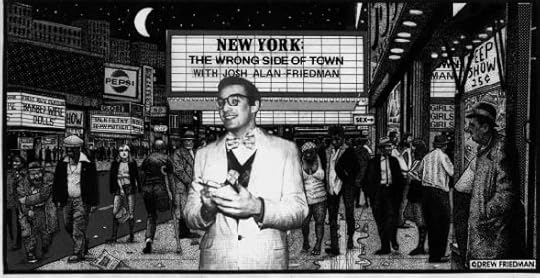
END OF AN ERROR
This week marks the 225th Naked City column I've written under my own byline. It is also the last.
When I first inherited this wild beast of a job, in Issue #678, March 1, 1982, I was then Senior Editor of Screw. I'd been editing "Tony Esperanto's" Naked City as part of my weekly function. Esperanto was the pen name of another Screw editor who'd done Naked City for five years. I never wanted to take over these listings, but it seemed inevitable. Custom had it, since the inception of Screw, that whoever handled Naked City would use an Italian pseudonym. That way, some mobster couldn't threaten whoever gave his massage parlor a bad review, or might figure it was written by some Guido you don't fuck with. For years, Naked City carried the byline "Rocco."
I was never one to believe in pseudonyms, and thus remember a few sleepless nights after I took over this column. Several dives objected to their lowered ratings, and protested through odd and varied means of communication. One obvious tactic a proprietor might take upon a lowered cock rating in Screw was to mail me an onslaught of letters. Every letter purported to be a regular reader of Screw who was outraged that his favorite club had been lowered in the ratings. Each of the 30 letters would have the same town post office mark, or be written in identical style, thereby exposing the owner's obvious ploy. Fake letters became quite easy to differentiate from authentic ones.
This column has taught me how to write like no other training ground—simply because I had to make a deadline very week, for four-and-a-half years. It was often an edgy, nervous type of writing, because you were reviewing the kind of joints that maybe the owners didn't want anyone nosing around or drawing attention to. The stripper profiles were most fun, particularly Hyapatia Lee, Candy Samples, Kelly Everts, even last week's backstage romp with Sue Nero. My "Sex in Brooklyn" series and "Sex in Queens" series, as well as anything to do with the Harmony/Melody Burlesk, stand out as peculiarities that only Al Goldstein's World's Greatest Newspaper would cover. "The Consumer's Guide to Erotic Entertainment," a lame subtitle I inherited under the Naked City logo, was the world's first Ralph Nader-type watchdog listing for the consumer pecker. These establishments exist, so why the hell not have a protective customer guide for them?
If I saw a horse vomit in Times Square, spent Thanksgiving at McDonald's, Christmas in the drunk tank, or imagined I saw the lights go on at the All-Live, Whirly-Girly Revue on 46th St., first time since '62—I could write about it, then see my nightmare produced in smeary newsprint the next week in this column, off my chest and onto yours. Even if only two people might read it. But if any of my loyal readership feels a tinge of regret over my departure, let me refer you to my new book, out in a week: Tales of Times Square, published in hardcover by Delacorte Press. It contains the meat of every secret I've learned from Naked City, and my 10-year association with Screw. It is like this very column, although "respectably" packaged so that thousands (hopefully millions) can read about Times Square throughout the world.
As for the work I've done herein, protecting you, the unlaid, masturbating Screw reader—laying my cock on the line so that yours may be safe—I'll give myself a 3 1/2 rating. The sex biz is really on the skids. But I drink a toast to all the joints and dives listed here, 'cause they're more humane than what's gonna replace 'em.
Farewell, suckers.
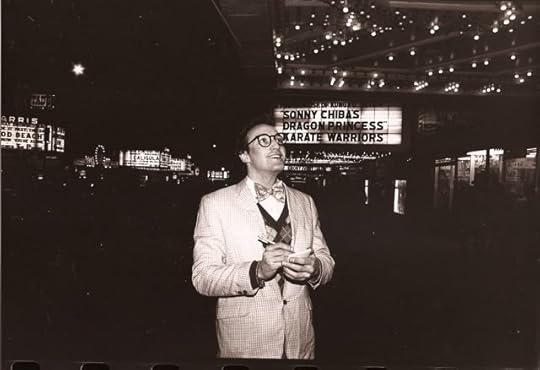
artwork by Drew Friedman. Visit his blog.
text and photos © 1986, 2011 Josh Alan Friedman

Reprinted from Screw, June 23, 1986

END OF AN ERROR
This week marks the 225th Naked City column I've written under my own byline. It is also the last.
When I first inherited this wild beast of a job, in Issue #678, March 1, 1982, I was then Senior Editor of Screw. I'd been editing "Tony Esperanto's" Naked City as part of my weekly function. Esperanto was the pen name of another Screw editor who'd done Naked City for five years. I never wanted to take over these listings, but it seemed inevitable. Custom had it, since the inception of Screw, that whoever handled Naked City would use an Italian pseudonym. That way, some mobster couldn't threaten whoever gave his massage parlor a bad review, or might figure it was written by some Guido you don't fuck with. For years, Naked City carried the byline "Rocco."
I was never one to believe in pseudonyms, and thus remember a few sleepless nights after I took over this column. Several dives objected to their lowered ratings, and protested through odd and varied means of communication. One obvious tactic a proprietor might take upon a lowered cock rating in Screw was to mail me an onslaught of letters. Every letter purported to be a regular reader of Screw who was outraged that his favorite club had been lowered in the ratings. Each of the 30 letters would have the same town post office mark, or be written in identical style, thereby exposing the owner's obvious ploy. Fake letters became quite easy to differentiate from authentic ones.
This column has taught me how to write like no other training ground—simply because I had to make a deadline very week, for four-and-a-half years. It was often an edgy, nervous type of writing, because you were reviewing the kind of joints that maybe the owners didn't want anyone nosing around or drawing attention to. The stripper profiles were most fun, particularly Hyapatia Lee, Candy Samples, Kelly Everts, even last week's backstage romp with Sue Nero. My "Sex in Brooklyn" series and "Sex in Queens" series, as well as anything to do with the Harmony/Melody Burlesk, stand out as peculiarities that only Al Goldstein's World's Greatest Newspaper would cover. "The Consumer's Guide to Erotic Entertainment," a lame subtitle I inherited under the Naked City logo, was the world's first Ralph Nader-type watchdog listing for the consumer pecker. These establishments exist, so why the hell not have a protective customer guide for them?
If I saw a horse vomit in Times Square, spent Thanksgiving at McDonald's, Christmas in the drunk tank, or imagined I saw the lights go on at the All-Live, Whirly-Girly Revue on 46th St., first time since '62—I could write about it, then see my nightmare produced in smeary newsprint the next week in this column, off my chest and onto yours. Even if only two people might read it. But if any of my loyal readership feels a tinge of regret over my departure, let me refer you to my new book, out in a week: Tales of Times Square, published in hardcover by Delacorte Press. It contains the meat of every secret I've learned from Naked City, and my 10-year association with Screw. It is like this very column, although "respectably" packaged so that thousands (hopefully millions) can read about Times Square throughout the world.
As for the work I've done herein, protecting you, the unlaid, masturbating Screw reader—laying my cock on the line so that yours may be safe—I'll give myself a 3 1/2 rating. The sex biz is really on the skids. But I drink a toast to all the joints and dives listed here, 'cause they're more humane than what's gonna replace 'em.
Farewell, suckers.

artwork by Drew Friedman. Visit his blog.
text and photos © 1986, 2011 Josh Alan Friedman
Published on August 01, 2011 00:01
Josh Alan Friedman's Blog
- Josh Alan Friedman's profile
- 22 followers
Josh Alan Friedman isn't a Goodreads Author
(yet),
but they
do have a blog,
so here are some recent posts imported from
their feed.



